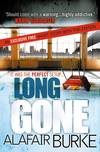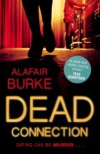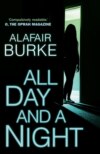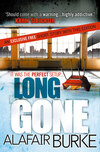Kitabı oku: «Long Gone»
Alafair Burke
Long Gone

Copyright
This novel is entirely a work of fiction. The names, characters and incidents portrayed in it are the work of the author’s imagination. Any resemblance to actual persons, living or dead, events or localities is entirely coincidental.
AVON
A division of HarperCollinsPublishers
1 London Bridge Street
London SE1 9GF
First published in the U.S.A by HarperCollins Publishers, New York, NY, 2011
Winning first published 2011 in the UK by Avon
Published by HarperCollins Publishers 2011
LONG GONE. Copyright © Alafair Burke 2011. All rights reserved under International and Pan-American Copyright Conventions. By payment of the required fees, you have been granted the nonexclusive, nontransferable right to access and read the text of this e-book on-screen. No part of this text may be reproduced, transmitted, downloaded, decompiled, reverse-engineered, or stored in or introduced into any information storage and retrieval system, in any form or by any means, whether electronic or mechanical, now known or hereinafter invented, without the express written permission of HarperCollins e-books.
HarperCollinsPublishers has made every reasonable effort to ensure that any picture content and written content in this ebook has been included or removed in accordance with the contractual and technological constraints in operation at the time of publication
Alafair Burke asserts the moral right to be identified as the author of this work
A catalogue record for this book is available from the British Library
Source ISBN: 9781847561121
Ebook Edition © JUNE 2011 ISBN: 9781847562623
Version: 2018-07-25
In memory of David Thompson
Contents
Title Page
Copyright
Prologue: The Kiss
Part I: Too Good to be True
Chapter One
Most of the best things in life came to Alice…
Chapter Two
Becca Stevenson had a secret.
Chapter Three
Four days after Alice first met Drew Campbell at the…
Chapter Four
Hank Beckman watched the digital numbers change on the pump,…
Chapter Five
There was a time when the name of Manhattan’s Meatpacking…
Chapter Six
Drew accelerated through the loop into the Holland Tunnel. She…
Chapter Seven
Joann Stevenson felt a tongue between her toes and jerked…
Chapter Eight
“Please tell me this is one of your practical jokes.”
Chapter Nine
Thanks to the radio station’s Two-for-Tuesday playlist, Hank lost track…
Chapter Ten
Alice remembered a time when the sultry baritone of her…
Chapter Eleven
Joann could not help but feel she was somehow being…
Chapter Twelve
Alice blew hot breaths into her cupped fists, trying to…
Chapter Thirteen
Alice had been hunched over her laptop so long that…
Chapter Fourteen
Hank Beckman made it to Jersey before the crack of…
Chapter Fifteen
Her apartment had to be cold—it always was in the…
Chapter Sixteen
“God damn it.”
Chapter Seventeen
How did this happen?
Chapter Eighteen
Hank threw an offhand wave toward Charlie Dixon as he…
Chapter Nineteen
Even with his eyes closed, Morhart would have known his…
Chapter Twenty
Alice was bundled in Jeff’s white terry bathrobe, her hair…
Chapter Twenty-One
Morhart was at Linwood High School for the second day…
Chapter Twenty-Two
Alice was in her bed, thinking about friendship.
Part II: Nothing to Hide
Chapter Twenty-Three
You’ve heard what they say about pictures and a thousand…
Chapter Twenty-Four
“Lady, first you want me to go to Jersey. Now…
Chapter Twenty-Five
“What do you mean, she had a cell phone?”
Chapter Twenty-Six
Hank Beckman was only forty-eight years old, but there were…
Chapter Twenty-Seven
The city of New York claims more than eight million…
Chapter Twenty-Eight
It had been four weeks since Alice’s last visit to…
Chapter Twenty-Nine
Only forty miles of road separated Dover, New Jersey, from…
Chapter Thirty
“Fuck, I feel guilty. I sat here and bitched for…
Chapter Thirty-One
Hank Beckman felt like a dying man who had planned…
Chapter Thirty-Two
There was a time when the Upper East Side was…
Chapter Thirty-Three
It had been five days since Becca Stevenson had disappeared,…
Chapter Thirty-Four
“Now we’re at the height of our practice. Trikonasana, triangle…
Chapter Thirty-Five
Alice tried to make herself small inside the tiny alcove…
Chapter Thirty-Six
Hank Beckman popped his third Advil in as many hours.
Chapter Thirty-Seven
It was Alice’s second trip to the Upper East Side,…
Chapter Thirty-Eight
“This might have been a bad idea.”
Chapter Thirty-Nine
“Good to see you again, Morhart.”
Chapter Forty
Even in better days, Alice felt an intense irritation navigating…
Chapter Forty-One
“Holy shit, you actually picked up your phone.”
Chapter Forty-Two
Alice rose from damp moss beneath a towering mulberry tree,…
Chapter Forty-Three
The next time she opened her eyes, she felt groggy.
Part III: Memories
Chapter Forty-Four
Joann Stevenson hit the play button once again on her…
Chapter Forty-Five
Alice maintained a brisk but unexceptional pace down Second Avenue…
Chapter Forty-Six
As Alice watched clumps of hair fall from the scissor…
Chapter Forty-Seven
Alice caught a glimpse of her own reflection in the…
Chapter Forty-Eight
Just as Beckman had predicted, they pulled off 684 at…
Chapter Forty-Nine
“Don’t you need a search warrant or something?”
Chapter Fifty
Joann Stevenson felt like the wind had been knocked out…
Chapter Fifty-One
The home in which Christie Kinley had supposedly passed away…
Chapter Fifty-Two
They were back at their motel outside White Plains, strategizing…
Chapter Fifty-Three
It was nearly four o’clock, and Jason was still pissed…
Part IV: Mia
Chapter Fifty-Four
Alice’s disposable phone rang at 5:58 p.m. She recognized her…
Chapter Fifty-Five
Alice tapped her nails against Hank Beckman’s steering wheel, trying…
Chapter Fifty-Six
For two hours, she and Arthur had waited in Arthur’s…
Chapter Fifty-Seven
“I’d have to say this has been a much more…
Chapter Fifty-Eight
Jason Morhart managed to cram his truck into the hybrid-sized…
Chapter Fifty-Nine
“This is certainly a lovely treat.” Arthur Cronin was inspecting…
Epilogue
Alice was panting by the time she reached her turnoff…
Acknowledgments
A Special Note of Thanks
Winning: Alafair Burke
About the Author
Other Books by Alafair Burke
About the Publisher
PROLOGUE: THE KISS
Alice Humphrey knew the kiss would ruin everything.
“You’ve heard what they say about pictures and a thousand words.”
She looked up at the man—Shannon was his last name, the first hadn’t registered. He was the one with the faded, reddish blond hair. Ruddy skin. Puffy, like a drinker.
She didn’t like sitting beneath his eye level like this. In this tiny chair at her kitchen table, she felt small. Trapped. She mentally retraced her steps into the apartment, wondering if the seating arrangement had been planned for catastrophic effect.
Shannon and his partner—was it Danes?—had been waiting on the sidewalk outside her building. The two of them hunched in their coats and scarves, coffee cups in full-palmed grips to warm their hands, everything about their postures hinting at an invitation out of the cold. She, by contrast, hot and damp inside the fleece she had pulled on after spin class. She’d crossed her arms in front of her, trying to seal the warmth in her core as they spoke on the street, the perspiration beginning to feel clammy on her exposed face.
Shannon’s eyes darted between the keys in her hands and the apartment door before he finally voiced the suggestion: “Can we maybe talk inside?”
Friendly. Polite. Deferential. The way it had been with them yesterday morning. Only a day ago. About thirty-one hours, to be precise. They’d said at the time they might need to contact her again. But now today they suddenly appeared, waiting for her on the sidewalk without notice.
“Sure. Come on up.”
They’d followed her into the apartment. She’d poured herself a glass of water. They declined, but helped themselves to seats, selecting the two kitchen bar stools. She opted for the inside chair of the two-seat breakfast table, leaving herself cornered, she now realized, both literally and figuratively. But hers was the obvious choice, the only place to sit in the small apartment and still face her unannounced guests.
She’d unzipped her fleece, and found herself wishing she’d showered before leaving the gym.
They’d eased into the conversation smoothly enough. Initial banter up the stairs about how they should both get more exercise. Just a few follow-up issues, Shannon had explained.
But there was something about the tone. No longer so friendly, polite, or deferential. The surprise visit. Her heart still pounding in her chest, sweat still seeping from her scalp, even though she had finished her workout nearly half an hour ago. Maybe it was a subconscious shaped by television crime shows, but somehow she knew why they were here—not the reasons behind the why, but the superficial why. Even before the kiss, she knew they were here about her.
And then came their questions. Her finances. Her family. The endless “tell us agains”: Tell us again how you met Drew Campbell. Tell us again about this artist. Tell us again about the trip to Hoboken. Like they didn’t believe her the first time.
But it wasn’t until she saw the kiss that she realized her life was about to be destroyed.
Shannon had dropped the photograph on the table so casually. It was almost graceful, the way he’d extended his stubby fingers to slide the eight-by-ten glossy toward her across the unfinished pine.
She looked down at the woman in the photograph and recognized herself, eyelids lowered, lips puckered but slightly upturned, brushing tenderly against the corner of the man’s mouth. She appeared to be happy. At peace. But despite her blissful expression in the picture, the image shot a bolt of panic from her visual cortex into the bottom of her stomach. She inhaled to suppress a rising wave of nausea.
“You’ve heard what they say about pictures and a thousand words.”
She’d pulled her gaze from the picture just long enough to look up at Detective Shannon. His clichéd words echoed in her ears, her pulse playing background percussion, as her eyes returned to her own image. There was no question that the man in the photograph was Drew Campbell. And even though the cognitive part of her brain was screaming at her not to believe it, she had to admit that the lips accepting his kiss were her own.
She ran her fingertips across the print, as if the woman in the picture might suddenly turn her head so Alice could say, “Sorry, I thought you were someone else.” She felt the detectives looking down at her, waiting for a response, but she couldn’t find words. All she could do was shake her head and stare at the photograph.
Alice Humphrey knew the kiss would destroy her life because thirty-one hours earlier she had stepped in Drew Campbell’s blood on a white-tiled gallery floor. She’d fumbled for a pulse, only to feel doughy, cool skin beneath her trembling fingers. And until she’d seen this picture, she would have sworn on her very life that, other than a handshake, her palm pressed against his still carotid artery was the only physical contact she’d ever shared with the man.
She’d had a crappy year, but had never paused to appreciate the basic comforts of her life—its ordinariness, the predictability, a fundamental security of existence. All of that was in the past now.
Alice had no idea what would happen next, but she knew the photograph would shatter everything. And she knew this was only the beginning.
PART I
CHAPTER ONE
FOUR WEEKS EARLIER
Most of the best things in life came to Alice organically. Not because she asked. Not because she looked. Not because she forced. They happened because she stumbled onto them. The high-flying philosophical question of whether the pieces of her life fell into place through luck, randomness, fate, or unconscious intuition was way above her pay grade, but somehow things usually worked out for her.
She ended up an art major because a course she took on the art of Italian Renaissance courts turned out not to count toward her declared history concentration. She wound up back in Manhattan after college because she followed a boyfriend home. She’d found her current apartment when she overheard a man sitting next to her at a bar tell his friend that he’d been transferred to the Los Angeles office and would have to break his lease. The opportunity Drew Campbell handed to Alice came not only when she’d needed it most, but also in a way that felt exactly as it should—natural, discovered, meant to be.
The gallery was in the Fuller Building, one of her favorites. She paused on her way in to admire the art deco features dotted generously inside and out. The opening reception was the artist’s first public appearance in a decade, so she expected the exhibition to be packed. Instead she found plenty of room to pace the spacious gallery, wineglass in hand, as she leisurely studied the overlapping abstract shapes, layered so meticulously on the canvases that it seemed they might leap weightlessly from the wall and float away into the sky.
She noticed him before he ever approached her, flipping through the price list as he admired one of the larger works, a carnival scene in oil. Beneath a few days of fashionable stubble, his face was very severe in a way that was both handsome and out of place in a froufrou gallery, but his clothing signaled he was in the right spot. She watched him speak to the emaciated, black-bunned woman she recognized as the gallery’s owner. She wondered what he’d be paying for the canvas.
Alice was pleased when she felt him looking at her. Optimistic enough to meet him halfway across the gallery, she paused in front of an abstract of layered triangles and then smiled to herself as he made his way over.
“It’s a shame there aren’t more people here,” he said. “Drew Campbell.”
She returned the handshake and introduction.
“So, Alice, what are your theories about this dismal turnout?”
“It’s crazy, right? You know some gallery down in Chelsea is packed tonight for a gum-chewing punk just out of art school who doodles celebrities. Meanwhile, this man could have been Jackson Pollock, and it’s like Mormon night at the vodka bar in here.”
The artist, Phillip Lipton, was at one time a recognized figure in the New York school of abstract expressionism, a contemporary of Pollock, de Kooning, Rauschenberg, and Kline. Apparently none of this was lost on her new acquaintance.
“I know an art dealer who used to represent him. You would not believe the player the old man used to be. You’ve heard of picky guys who only date skinny girls or blondes? Well, he supposedly only dated ballerinas, and yet—despite that very narrow limitation—always managed to have a new nimble babe at his side each week. There was a joke that he must have been fattening them all up with steak and ice cream so the New York City ballet company would have to replace them one by one. He’d hold court in the Village at One if by Land.”
She could picture the younger version of the artist at that restaurant, smoking cigarettes, wearing that fedora he always seemed to sport in the few photographs available of him in that era. Now Lipton was a ninety-one-year-old man whose sixty-year-old wife was brushing away crumbs from his jacket lapel at an underattended exhibition with, so far, only two “sold” tags posted, including the one the gallery owner had just slipped next to the carnival painting Drew had been admiring.
“So you’re interested in art?” Drew said.
“Until recently, it was my profession.” She told him about her former job at the Met, truncating the long personal story behind her dismissal. It was easier to chalk her current unemployment up to the museum budget cuts and layoffs that had made newspaper headlines.
The conversation between them came easily. He had a good, natural smile. Earnest eye contact. The appearance of a genuine interest in what she had to say. It was strange: there was nothing sexual about it, and yet she felt herself getting pulled in, not by the man’s looks or charm but by the refreshing feeling of being treated as if she mattered. Not merely as her father’s daughter. And not like an out-of-work single woman whose petals had already begun to wilt.
As she felt herself brightening in a way she could barely remember, it suddenly dawned on her how eight months of unemployment had taken their toll. Without even recognizing the transformation, she had started to see herself as a loser.
Alice never meant to be a thirty-seven-year-old woman without a career, but she knew that plenty of less fortunate people would question the choices she’d made along the way. Even in the beginning, she hadn’t gone to one of the intellectually rigorous prep schools that happily would have had her, opting instead to be with her more socially inclined friends. But, unlike most of them, she worked hard. She went to college—and not just a party school with a fancy reputation, but an actual school known for its academics.
Granted, it was a funky liberal arts college and not an Ivy League, and then followed by the few requisite years of postcollege floundering that were typical for her crowd. The two-year stint as a publicist for a cosmetics company. That disastrous three-year marriage in St. Louis before she’d realized her mistake. But she’d started over, returning to school for her master’s in fine arts. And when she was finished, she’d gone to work in the development office of what she believed to be the most impressive building in the world—the Metropolitan Museum of Art.
Now, in hindsight, she realized how silly and indulgent all of those choices had been. Her parents spent a fortune on high school tuition just so she’d land at an even more expensive college that no one aside from a few tweed-jacketed PhDs had heard of. Then she double-downed with that graduate degree.
When she’d landed the job at the Met, she’d been stupid enough to believe she’d earned it. Maybe if she had been hired for merit—her knowledge of art, her ability to raise money, her marketing experience, a demonstrated skill at something—she’d still be there in her cubicle above Central Park, quietly drafting the pamphlet to announce the upcoming Chuck Close exhibit to the museum’s most generous donors.
Or if she had at least recognized the truth, maybe she would have predicted that a decision in her personal life would affect her employment. She would have realized how ridiculous she must have looked when she’d announced to her father that she no longer wanted his help. No more rent payments or annual “gifts.” Her absolute insistence: No more help, Papa.
Well, unbeknownst to her, some of his help had being going to the museum, and when the donations dried up and the Met had to make layoffs, she was among the first on the chopping block.
It wasn’t until she updated her résumé that she realized that her adult life didn’t exactly add up to the perfect formula for employment in the current economy. In the eight months that had passed since her layoff, she had been offered precisely one job: personal assistant to a best-selling crime novelist. A friend who knew of Alice’s plight was among a fleet of the man’s rotating companions and suggested her for the job. She warned Alice that the man could be frugal, so when he wanted Alice to return his half-eaten carton of yogurt to the deli because he didn’t like the “seediness” of the raspberry flavor, Alice had sprung for the new $1.49 carton of smooth blueberry. The friend had also warned Alice of his “nonconformist” ways, so Alice compliantly agreed when he’d asked her to restrain him atop his dining room table so he could figure out how his character might escape his predicament. But she had finally pulled the plug when the boss’s two questionable characteristics merged together in a single request: that she personally participate in a three-way with him and a hired escort so he could collect “quotidian details” of the experience without paying double.
Alice promptly resigned, but still kicked herself at the manner in which she’d done it—blaming it on his erratic hours instead of raising her knee directly into the glorified subject of most of his research. Maybe it was because she’d been thinking about that short-lived job—and the belittlement it still invoked—that she wanted to believe the part of the conversation with Drew Campbell that came next.
“Would you be interested in managing a gallery of your own?”
Normally, she would have choked on her wine at the absurdity of the question, but Drew floated it past her in a way that felt as natural as an observation about the weather.
“Of course. I always assumed I’d work in the art world in some way or another. I think I just underestimated how hard it was to get and keep this kind of work.”
The art world, as even tonight’s featured artist exemplified, was a young person’s domain. And Alice was a woman. And she wasn’t even an artist. And at thirty-seven, she was already past her prime.
“I’ll have to check on a few things, but you might be the perfect person for a new gallery I’m helping with.”
“What kind of position?”
“Manager. It’s a small place, but we need someone who will really pour themselves into it.”
She was unemployed. Her last job was fetching coffee for a sociopath who should probably be on a sex offender registration. It was hard to believe anyone legitimate would hand her the keys to a gallery. Her skepticism must have shown in her face.
“Now don’t go picturing a gallery like this. And I should probably warn you, it’s a bit of a risk as far as employment goes. I’ve got a client—a guy I’ve bought art for—he’s what his friends call eccentric. If he didn’t have money, they’d call him a nutcase.”
“Eccentric? I’ve fallen for that line before.”
“Trust me. It’s nothing weird. This is one of my oldest clients. He was a friend of my father’s, actually, so he’s been letting me help him out for years. With time, he’s come to really trust me. Turns out he’s a quiet old guy who likes the company of younger men. He treats them well, and they provide companionship, if you know what I mean.”
“Not exactly subtle.”
“Anyway, his most recent friend has been in the picture longer than most, and I guess my client is ready to provide a more substantial level of support. He wants a modest little gallery to showcase emerging artists. Of course one of the artists will have to be his friend. This kid’s gotten his work in a few group showings, but he still hasn’t landed a solo exhibit at a New York gallery.”
“But thanks to your client, he’ll soon be a featured artist.”
“Exactly. And I’m sure he’ll be very grateful to my client for the support.”
“You keep referring to him as ‘your client.’”
“Trust me. You’ve heard of him. And while there have been rumors about his personal life for decades, it’s all unconfirmed, so I’m not about to out him. But, I kid you not, he is a serious collector. That piece I just held is for him. If I can find the right space and the right person to run a gallery, he won’t get in the way. He won’t even take credit for owning it. But he’ll want it to be a place he’d be proud of. Cutting edge. A little antiestablishment, but really good stuff. This would be a good opportunity for someone in your shoes.”
“Sounds like a good opportunity for anyone.”
He shrugged. “I’ve quietly spoken to a few people, and they wouldn’t pull the trigger. They’re worried the owner will move on to some other passion project—a gallery today, a gourmet hamburger stand tomorrow. Then there’s my client’s consort to worry about. He can’t be thrown to the wayside like any other artist.”
“Not everyone would be so forthcoming about the backstory.”
“I’m not willing to burn bridges to satisfy the whims of a fickle old man, even if I do love him like my own closeted gay uncle. Some of the more established people I’ve approached just aren’t willing to take the leap under the circumstances. You might not have the luxury of their worries.”
“If that’s a nice way of saying beggars can’t be choosers, consider yourself begged.”
Like a teenage girl going home after her first concert, Alice left the gallery with a signed brochure from the exhibit and a feeling that the person she had met there just might change her life.
















